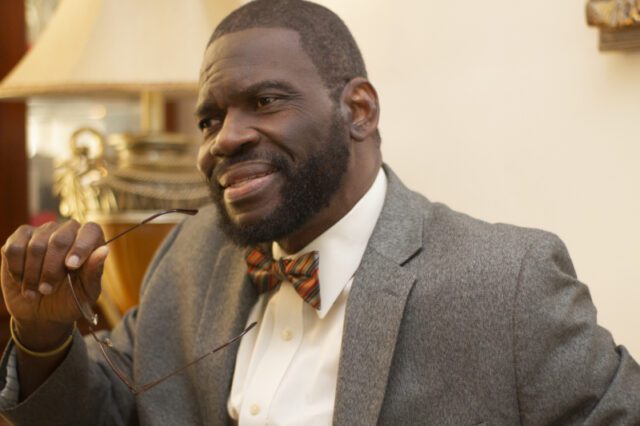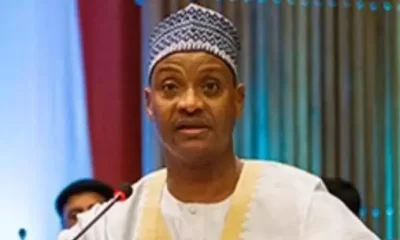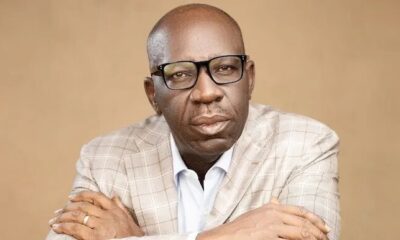Educational Issues
Dress Code Dilemma at NOUN: Cassandra Michael Advocates for Fairness, Transparency, and the Need for Legal and Institutional Clarity -By John Egbeazien Oshodi
The evolution of dress code policies should not only address immediate concerns but should also contribute to the progressive development of Nigerian educational institutions. As the nation advances, a thoughtful and inclusive approach to dress code policies will play a pivotal role in shaping an educational landscape where students feel informed, respected, and empowered.

A psychologist explores Nigeria’s institutions amidst Dress Code Controversies at NOUN: Cassandra Michael’s Advocacy for Fairness, Transparency, and the Need for Legal and Institutional Clarity.
In the heart of the National Open University of Nigeria (NOUN), a recent incident involving a female student, Cassandra Michael, has ignited a critical discourse on dress code policies in Nigerian educational institutions. The controversy emerged when Cassandra was denied entry to an examination hall, allegedly due to improper dressing. This incident not only spotlights the need for clear and transparent dress code guidelines but also emphasizes the importance of legal recourse and the empowerment of students, particularly females, to advocate for their rights.
A video of Cassandra Michael being denied entry to an examination hall at the Garki Study Centre went viral, capturing a moment of distress as she claimed an invigilator cited her dressing as inappropriate. Cassandra, determined to address the perceived injustice, took to social media to share her experience and challenge the university’s actions.
The Director of the Directorate of Examinations and Assessment at NOUN, Professor Olugbenga Ojo, responded to the incident, suggesting that it was premeditated. He mentioned that the student’s friend, who came for an exam earlier, was also improperly dressed, asked to change, complied, and faced no issues. Professor Ojo indicated that Cassandra wanted to cause a scene and refused to enter the examination hall even after being asked to do so.
Amidst conflicting narratives, there is a growing call for fairness and transparency from the university regarding its dress code policies. Cassandra’s video and subsequent claims highlight the need for specific details from the policy allegedly violated, fostering a better understanding of the expectations for students, especially females. An essential question arises: Does each student have a student handbook with dressing policies? This would enable a comparison to the attire Cassandra wore in the video, providing a clearer perspective on the alleged violation.
The severity of the incident has prompted discussions about legal recourse. Cassandra, facing emotional distress, physical mistreatment, and denial of her right to take exams, may consider pursuing legal action. A lawsuit could serve not only as redress but also for seeking clarity on the university’s dressing policies, ensuring fair and consistent application. Institutional clarity is crucial to avoiding misunderstandings and conflicts related to dress code enforcement.
Recognizing that Nigeria is a developing society, there is an opportunity to learn from international practices, particularly those in American schools, to formulate comprehensive dress code expectations. For females and males, considerations such as modesty, appropriate coverage, and restrictions on graphic content provide valuable insights.
Establishing explicit dress code policies in Nigerian educational institutions is crucial to preventing misunderstandings and conflicts. Clear guidelines contribute to a positive learning environment, emphasizing professionalism and discipline while ensuring students, especially females, feel informed and respected.
Cassandra’s vocal stand against the alleged mistreatment of female students at NOUN highlights a broader concern. She asserted, “What they are doing to us, some people cannot come out today, but I’m going to say it because I know my rights and that’s why I’m here.” This advocacy underscores the significance of creating an environment where female students feel empowered to speak out against perceived injustices.
It is imperative to address concerns regarding Professor Olugbenga Ojo’s defensive stance and contradictions. Instead of dismissing Cassandra’s grievances, a more constructive approach involves addressing the specific issues raised, promoting a dialogue that seeks to understand the female student’s perspective, and working towards a resolution that ensures fairness and justice. Ojo should transparently communicate the university’s dress code policy to eliminate contradictions and provide clarity to the Nigerian public. In the aftermath of this recent incident at the National Open University of Nigeria (NOUN), there emerges a pressing need to reevaluate and establish clear dress code policies in Nigerian educational institutions.
This incident underscores the significance of proactive measures to establish transparent guidelines that foster an inclusive and respectful learning environment. Drawing inspiration from international practices, particularly those in progressive schools, can offer valuable insights into formulating comprehensive dress code expectations. For females, modesty in skirt and shorts length, appropriate coverage for tops, and restrictions on graphic content are common considerations. Similarly, males are expected to wear pants at the waist, adhere to shirt coverage norms, and avoid clothing with inappropriate graphics.
Incorporating these principles into Nigerian educational institutions can provide a framework for defining what is considered acceptable attire. It is crucial, however, to recognize the unique cultural context of Nigeria and tailor these guidelines accordingly. While general considerations such as prohibiting inappropriate logos or messages, regulating head coverings, and addressing visible body piercings or tattoos remain relevant, the specifics must align with the values and norms of the local education system.
The importance of clear communication cannot be overstated. Educational institutions, including NOUN, should develop explicit dress code policies that are easily accessible to students. Establishing awareness campaigns and educational programs can help students understand and comply with these guidelines. This proactive approach promotes a culture of respect, professionalism, and discipline, essential for a conducive learning environment.
While the recent incident at NOUN has sparked a call for legal clarity and victim-centric responses, it also serves as a catalyst for broader change. The evolution of dress code policies should not only address immediate concerns but should also contribute to the progressive development of Nigerian educational institutions. As the nation advances, a thoughtful and inclusive approach to dress code policies will play a pivotal role in shaping an educational landscape where students feel informed, respected, and empowered.
In conclusion, the NOUN dress code controversy highlights the urgent need for transparent, fair, and inclusive dress code policies. As Nigeria progresses, addressing the concerns raised by incidents like these becomes pivotal in fostering a positive and supportive educational environment where female students, in particular, feel heard, respected, and empowered. Legal recourse, when necessary, can serve as a mechanism for redress and clarification, reinforcing the importance of accountability in educational institutions.

Professor John Egbeazien Oshodi, who was born in Uromi, Edo State, Nigeria, to a father who served in the Nigeria police for 37 years, is an American-based police and prison scientist and forensic, clinical, and legal psychologist. A government consultant on matters of forensic-clinical psychological services in the USA; and a former interim associate dean and assistant professor at Broward College, Florida. The Founder of the Dr. John Egbeazien Oshodi Foundation, Center for Psychological Health and Behavioral Change in African Settings. In 2011, he introduced state-of-the-art forensic psychology into Nigeria through N.U.C. and Nasarawa State University, where he served in the Department of Psychology as an Associate Professor. He has taught at various universities and colleges including Florida memorial University, Florida International University, Broward college, Lynn University, and a contributing faculty member at the Weldios university in Benin Republic, Nexus International University, Uganda, Nova Southeastern University and Walden University in USA. He is a Human Rights Psychologist with a focus on African related environments. joshodi@nova.edu




















